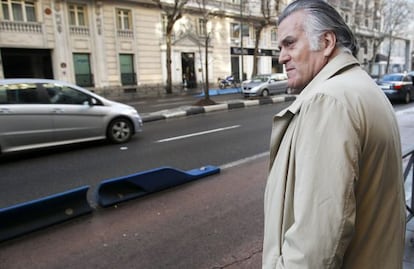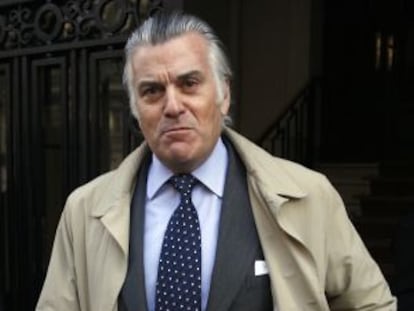Top PP officials shown to have taken payments on the side
Ledgers reveal that PM Rajoy was apportioned annual sum of 25,200 euros for 11 years Documents include donations from construction firms and businessmen implicated in Gürtel

The ruling Popular Party’s internal accounting between 1990 and 2008, to which EL PAÍS has had access, shows that the conservative grouping’s leading members were paid regular sums of money aside from their official salaries. The files, kept by former PP treasurers Álvaro Lapuerta and Luis Bárcenas, comprise a series of incoming items in the form of donations from companies, especially construction firms, and outgoing expenses, which include the payments to party leaders.
Among those who received payments on the side, according to the accounts kept by Bárcenas, is Prime Minister Mariano Rajoy. The PP president first appears listed in 1997, with sums of money next to his name that consistently add up to 25,200 euros a year, divided either in quarterly or six-monthly payments, and continuing up to 2008.
The party’s current secretary general, Dolores de Cospedal, also figures in the papers, with two entries of 7,500 euros next to her name in the second half of 2008, immediately after she had been ratified in her post by the PP convention in June of that year. De Cospedal has publicly denied knowledge that these payments were made by Bárcenas to party officials.

Mariano Rajoy, who was asked by this newspaper to comment on this story, declined to do so via a spokesperson. The prime minister said that he will not make any comment until he has seen the results of internal and external audits, ordered by him into the party’s finances in the light of the revelation earlier this year that Bárcenas had kept millions of euros in a Swiss bank account.
The secret ledgers also include regular payments of similar quantities to those noted down next to Rajoy’s name for previous PP secretary generals (Ángel Acebes, Javier Arenas and Francisco Álvarez-Cascos), leading figures Rodrigo Rato and Jaime Mayor Oreja, and the party’s deputy leaders.
The accounts, which also include other kinds of expenses, such as training courses, show final balance figures for each year. The books corresponding to the years 1993 to 1996 inclusive were not included in the documents seen by EL PAÍS.
The periodical payments began in 1997, a year after Aznar had led the PP into government
The periodical payments to leading party members are first registered in 1997, a year after then-party leader José María Aznar had led the PP into government for the first time in its history. Among the notes for the first months in the 1990 ledger and during two months in 1997, payments to “J. M.” are present. All of the outgoing payments recorded in 1990 are listed next to the same initials.
Among the donors listed as having given money to the party are businessmen implicated in the Gürtel kickbacks-for-contracts scandal, which has seen several PP officials resign from their posts in regional and municipal administrations. One of those noted as having made donations is Pablo Crespo, the number-two man in Francisco Correa’s PP-linked corruption network, who has since become a target of the ongoing judicial probe into Gürtel. Alfonso García Pozuelo, the owner of the building company Constructora Hispánica, and Valencian assembly speaker Juan Cotino, are also shown to have given money to the party treasurers. Like Crespo, both were later accused of wrongdoing in the Gürtel case.
According to Bárcenas’ bookkeeping, every year part of the total quantity of donations received was set aside and paid into a bank account at Banco de Vitoria (absorbed by Banesto in 2003). The fact that only part of the money received ended up being transferred to this bank account under the heading “donations” could imply that the Popular Party was engaged in illegal financing in as far as it was not declaring all of its income.
Tu suscripción se está usando en otro dispositivo
¿Quieres añadir otro usuario a tu suscripción?
Si continúas leyendo en este dispositivo, no se podrá leer en el otro.
FlechaTu suscripción se está usando en otro dispositivo y solo puedes acceder a EL PAÍS desde un dispositivo a la vez.
Si quieres compartir tu cuenta, cambia tu suscripción a la modalidad Premium, así podrás añadir otro usuario. Cada uno accederá con su propia cuenta de email, lo que os permitirá personalizar vuestra experiencia en EL PAÍS.
En el caso de no saber quién está usando tu cuenta, te recomendamos cambiar tu contraseña aquí.
Si decides continuar compartiendo tu cuenta, este mensaje se mostrará en tu dispositivo y en el de la otra persona que está usando tu cuenta de forma indefinida, afectando a tu experiencia de lectura. Puedes consultar aquí los términos y condiciones de la suscripción digital.









































